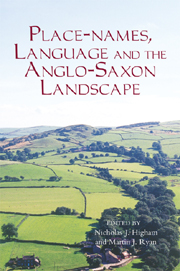Book contents
- Frontmatter
- Contents
- List of Illustrations
- Acknowledgements
- List of Contributors
- Abbreviations
- 1 Place-Names, Language and the Anglo-Saxon Landscape: An Introduction
- 2 The Landscape of Place-Name Studies
- 3 Place-Names as Travellers' Landmarks
- 4 Light thrown by Scandinavian Place-Names on the Anglo-Saxon Landscape
- 5 Language and the Anglo-Saxon Landscape: Towards an Archaeological Interpretation of Place-Names in Wiltshire
- 6 Hunting the Vikings in South Cumbria from Ambleside to Haverbrack
- 7 Viking-Age Amounderness: A Reconsideration
- 8 The Woodland Landscape of Early Medieval England
- 9 The Pre-Conquest Lands and Parish of Crediton Minster, Devon
- 10 Rewriting the Bounds: Pershore's Powick and Leigh
- 11 That ‘Dreary Old Question’: The Hide in Early Anglo-Saxon England
- 12 Boroughs and Socio-Political Reconstruction in Late Anglo-Saxon England
- Index
11 - That ‘Dreary Old Question’: The Hide in Early Anglo-Saxon England
Published online by Cambridge University Press: 05 February 2013
- Frontmatter
- Contents
- List of Illustrations
- Acknowledgements
- List of Contributors
- Abbreviations
- 1 Place-Names, Language and the Anglo-Saxon Landscape: An Introduction
- 2 The Landscape of Place-Name Studies
- 3 Place-Names as Travellers' Landmarks
- 4 Light thrown by Scandinavian Place-Names on the Anglo-Saxon Landscape
- 5 Language and the Anglo-Saxon Landscape: Towards an Archaeological Interpretation of Place-Names in Wiltshire
- 6 Hunting the Vikings in South Cumbria from Ambleside to Haverbrack
- 7 Viking-Age Amounderness: A Reconsideration
- 8 The Woodland Landscape of Early Medieval England
- 9 The Pre-Conquest Lands and Parish of Crediton Minster, Devon
- 10 Rewriting the Bounds: Pershore's Powick and Leigh
- 11 That ‘Dreary Old Question’: The Hide in Early Anglo-Saxon England
- 12 Boroughs and Socio-Political Reconstruction in Late Anglo-Saxon England
- Index
Summary
Maitland began the third essay in his magisterial Domesday Book and Beyond with something of an apology:
What was the hide? However unwilling we may be to face this dreary old question, we can not escape it. At first sight it may seem avoidable by those who are interested in the general drift of national life, but have no desire to solve petty problems or face unnecessary difficulties … Unfortunately, however, that question about the hide is ‘pre-judicial’ to all the great questions of early English history.’
The question that was dreary and old at the end of the nineteenth century nevertheless remains equally inescapable at the start of the twenty-first. As Maitland saw, understanding the meaning of the hide – in Old English híd, híwisc, or híwscipe – is pivotal to some of the most important debates about Anglo-Saxon England. At their heart, these debates have been concerned with the basic structures of English society and land tenure. Put simply, was Anglo-Saxon society based on communities of extended families or tribes of free peasant farmers who eventually succumbed to lordship and villeinage, or were the manor and manorial lordship features of English society from the very beginnings? If recent work has moved away from these basic oppositions, there remains, nevertheless, a concern to assess the relative freedom or unfreedom of the bulk of the Anglo-Saxon population. Understanding the hide likewise has the potential to inform debates about the origins of Anglo-Saxon England and the debt that it owed to the Roman or Celtic past.
- Type
- Chapter
- Information
- Place-names, Language and the Anglo-Saxon Landscape , pp. 207 - 224Publisher: Boydell & BrewerPrint publication year: 2011



